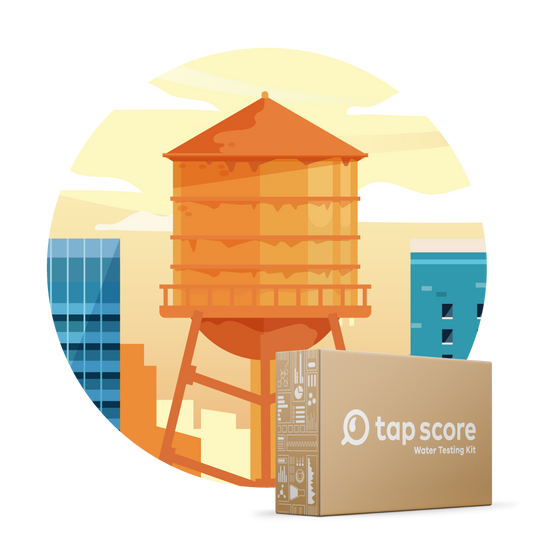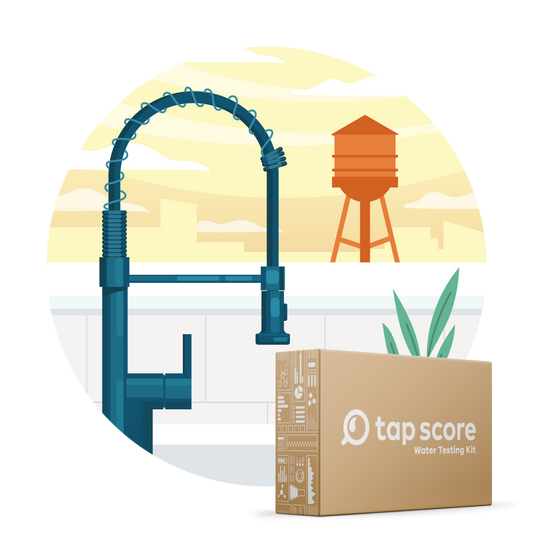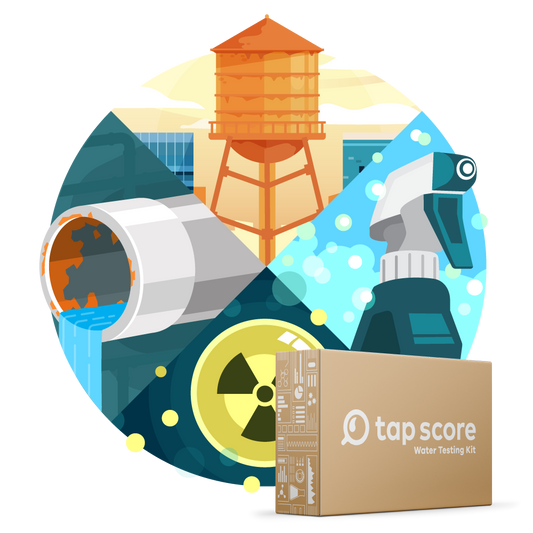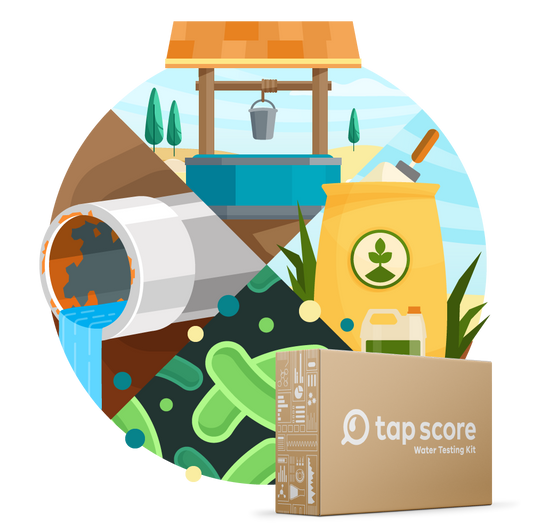
Expecting a Child? New Parents’ Guide to Water Safety
Our blog is written by real experts— not AI. Each guide is carefully reviewed and updated based on the latest research. Plus, with no affiliate links, you can count on unbiased insights you can trust.
Expecting a child or already have an infant or toddler in the home? Your drinking water quality is more important than ever. Environmental contaminants—like lead and nitrates—can impact development even in the womb. Because pregnant people and children have to drink much more water than the average person, there’s no better time to ensure the safety of your drinking water.
We’ve prepared the following scenario guide for those with or expecting new additions to their household. Learn about the most important contaminants to watch out for in your drinking water and discover how easy it is to access professional, certified laboratories for testing.
Table of Contents:
- Contaminants of Concern for Prenatal and Early Childhood Development
- Is It Safe to Drink Tap Water When Pregnant?
- Why Is Lab Testing Important for Expectant Parents?
- What Can I Do to Protect My Drinking Water for My Kids?
- Questions? Contact Us!
Key Takeaways:
- The bodies of infants and toddlers are still developing, making them less resistant to harmful substances.
- Lead and nitrates in particular are the most important things to test for in drinking water because they harbor serious developmental risks.
- Testing your water before bringing a new child into your home ensures you know what steps to take to give your baby the best start in life.
- Having a lab test your water is the only way to determine the precise concentrations of contaminants. Precision is paramount because children are hyper sensitive to changes in water quality.
Key Drinking Water Contaminants that Can Harm Prenatal and Early Childhood Development
If you are pregnant or have a newborn or small child in the house, you want to be on top of any risks to your child’s development.
Drinking water contaminants that can impact prenatal and early childhood development include:
- Lead
- Nitrate (and nitrite)
- Other heavy metals—including mercury, arsenic, cadmium, and chromium
- Pesticides
- PFAS compounds
- Coliform bacteria and other pathogenic microorganisms
- Disinfection byproducts (incl. total THMs and haloacetic acids)
- Fluoride*
*While there are potential risks, most operational concentrations are unlikely to pose a high risk (based on current knowledge). Research is still unfolding.
Why Is Lead So Harmful to Babies and Children?
Lead exposure is particularly harmful to infants and children under six because their developing bodies are highly sensitive. Lead is a potent neurotoxin, and, unlike adults, the physiological and neurological effects of lead exposure in children are considered irreversible.
 Toxic health effects of lead in water after both acute and chronic exposures and can impact nearly every organ system in the body. Even low levels of lead in a child’s blood stream can cause:
Toxic health effects of lead in water after both acute and chronic exposures and can impact nearly every organ system in the body. Even low levels of lead in a child’s blood stream can cause:
- Learning and behavioral problems
- Lower IQ and hyperactivity
- Slowed growth and development
- Hearing and speech problems
- Anemia
Remember: There is no safe level of lead in drinking water, particularly for infants and children.
How Lead Gets in City Drinking Water
Lead typically gets in drinking water through lead plumbing. Lead remains a major problem in cities across America, particularly for homes built prior to the mid-1990s.[1] Lead piping or even galvanized pipes can leach lead into drinking water. It is typically an issue for those on city water or public water supplies.
If you live in a home or apartment built prior to the mid-1990s, it’s particularly worthwhile to test your drinking water.
Why Are Nitrate and Nitrate So Harmful to Babies?
Nitrate (which partially converts into nitrite in the body) can impact red blood cells' ability to carry oxygen. For infants aged 12 months and younger, drinking water or formula with nitrates in it can cause methemoglobinemia, or “blue baby syndrome,” where a baby’s skin turns blue because their blood does not have enough oxygen. Other symptoms of "blue baby syndrome" include:
- Difficulty breathing
- Vomiting
- Diarrhea
- Seizures
- Loss of consciousness
Methemoglobinemia can also occur in the womb, although the acquired route is more common. Untreated, methemoglobinemia can lead to death.
How Nitrates Get in Drinking Water
Nitrates enter water supplies from fertilizer and/other animal waste runoff. Nitrates and nitrites are particularly an issue for private well owners in rural areas near industrial agriculture or large farms. If you are on well water, have your water tested by a lab annually to monitor your nitrate and nitrite levels.
What Metals in Drinking Water Should Be Avoided When Pregnant?
Other heavy metals, such as arsenic, mercury, cadmium, and chromium, are all harmful to early life development, but they are all less common in drinking water—on average—than lead. These heavy metals typically enter drinking water from natural mineral deposits, industrial activities near the region’s water supply, and household plumbing.
Pesticides and Childhood Development
Chronic exposure to harmful pesticides in drinking water can be a serious detriment to a child’s neurological development.[2] They are also harmful their immune systems.
Coliform Bacteria and Children
Because infants and children have immune systems that are still developing, the presence of coliform bacteria has an increased chance of causing illness such as upset stomach and flu-like systems, as well as diarrhea, vomiting, fever, abdominal cramps, nausea, headaches, and fatigue.
Bacterial contamination is more common in well water than in public water systems, which disinfect water before it leaves the treatment plant. If you are a utility customer dealing with coliform contamination, you will be notified and receive a boil water advisory.
For those on private wells, the presence of coliform bacteria can also be a potential indicator of harmful microorganisms that could cause more serious illnesses that can impact the whole family. It’s very important to test your water at any indication it may be contaminated by bacteria or other microorganisms.
Our Core Well Water Kits test for the presence/absence of coliform bacteria and E. coli. If you want to be more precise or have reason to suspect you water might be contaminated by other microorganisms, the Total Microbiology Water test is the most comprehensive option for total peace of mind:
THMs in Drinking Water and Children
When chlorine is used to disinfect drinking water supplies, it interacts with naturally occurring organic matter in the water and surrounding pipe material, prompting a series of complex chemical reactions. These reactions lead to the formation of disinfection byproducts, or DBPs. Many DBPs are halogenated compounds, which are potential carcinogens.
Trihalomethanes (or THMs) are a class of DBPs and include:
- Chloroform
- Bromodichloromethane
- Dibromochloromethane
- Bromoform
Haloacetic acids (HAAs) are another class of halogenated DBPs are include:
- Bromochloroacetic acid
- Bromodichloroacetic acid
- Chlorodibromoacetic acid
- Dibromoacetic Acid (DBA)
- Dichloroacetic Acid (DCA)
- Monobromoacetic Acid (MBA)
- Monochloroacetic Acid
- Tribromoacetic Acid
- Trichloroacetic Acid (TCA)
Treating drinking water presents a trade-off between short-term (e.g., potentially life-threatening infection from pathogens) and long-term health risks (i.e., DBPs), one where the short-term impacts are given precedence largely because waterborne illness is a leading cause of disease and death for children under 5.
Are These Long-term Risks Concerning for Parents?
While the exact health risks of these DBPs vary by compound, potential carcinogens may be a higher risk to children. Several of these compounds are suspected of causing developmental and reproductive effects. Taking action by filtering your water for DBPs can help reduce these risks without compromising the protective benefits of drinking water chlorination.
Quick Guide to Disinfection Byproducts (DBPs) in Drinking Water
Is it Safe to Drink Tap Water When Pregnant?
It depends on what contaminants might be in your tap water. Most tap water is treated to be protective of health under the Safe Drinking Water Act.
However, the regulatory limits of the EPA’s Maximum Contaminant Levels (MCLs) are not always conservative, because of technical or financial limitations. The EPA’s Maximum Contaminant Level Goals (MCLGs) are an attempt to provide the most conservative limits based on available research, but they are not enforceable. They remain a better guidance for new and/or expecting parents than the EPA’s MCLs.
Developmental toxicants tend to impact a growing fetus by negatively affecting the placenta or traveling directly to the fetus via the placenta, which has been shown possible for lead, nitrates, mercury, and PFAS.
Additionally, on-premise plumbing or contamination issues can impact the final tap water quality. Testing your water when expecting a child helps you better understand if you have any water quality issues.
Remember: Infants and children have organs that are still developing. Their bodies are generally less resistant to harmful substances. Additionally, pound for pound, children drink more than twice as much water as adults do, meaning they are positioned to consume a higher absolute amount of any contaminants in the water.
Why Is Lab Testing Drinking Water Important for New Parents?
Laboratory water analysis is vital for parents because it is the only way to determine the concentrations of contaminants that may be in your drinking water. Lab testing drinking water testing can indicate presence of contaminants at very low levels, which is important for contaminants like lead, which has no safe level. Because children, infants, and fetuses are so sensitive, you want to know whether trace contaminant levels exist.
Additionally, contaminants like lead and nitrates cannot be seen, smelled, or tasted. And DIY test strips cannot detect harmful contaminants with anything approaching the precision necessary to keep your children safe.
Which Water Test Is Right for Expecting Parents?
You’ll want to be sure your water is tested by a certified laboratory. Certified laboratories have been independently evaluated to ensure they provide accurate test data and are unbiased in their reporting.
If you’re on city water (i.e., a public water system) you’ll want to be sure your water test includes analysis for:
- Lead (and other heavy metals)
- Disinfection byproducts (incl. total THMs and haloacetic acids)
- VOCs
- General water parameters (hardness, TDs, pH, etc.)
If you’re on a private well, you’ll want to be sure your test includes analysis for:
- Nitrates
- Coliform bacteria
- Lead
- Arsenic (which can be a natural part of groundwater aquifers)
- VOCs (particularly pesticides)
- General water parameters
Tap Score's core kits test for all of these and more, like water quality parameters that can impact how contaminants interact with your plumbing. We've streamlined the process to include certified lab testing, free shipping, and an easy-to-read report that puts your results in context with every purchase.
Should I Test My Water for PFAS?
Yes, for both city and well water, PFAS may be a risk expectant and/or new parents want to know about. If you’re on city water, you can check to see if your utility has conducted PFAS testing and decide to test accordingly. If you are on a well, you may want to evaluate PFAS in your water if you are near landfill, industrial sites, or contaminated surface water.
Other Contaminants of Concern Parents Should Look Out for:
- Microplastics: Tiny, often microscopic plastic particles found everywhere around us. Information on their specific health impacts is limited, but research shows they can be toxic, with children being more vulnerable.
- Pharmaceuticals: Little is known about the health effects of trace pharmaceuticals in drinking water, but children are thought to be more vulnerable due to their smaller size.
- Glyphosate: A pesticide that can be neurotoxic at elevated concentrations. Children are especially vulnerable to its effects.
- Radon: A cancer-causing radioactive gas. If it is detected in drinking water, it’s likely in the air too. Children are more vulnerable to radon in air due to having smaller lungs and faster breathing rates.
- Asbestos: Although linked to increased risk of lung cancer and mesothelioma when inhaled, little is known about the health effects of asbestos ingested through water.
- Manganese: An essential mineral, but neurotoxic at elevated levels. Excessive exposure may harm children's neurodevelopment, especially in infants.
- Mold & Fungus: Certain molds and fungi, like black mold, can irritate children’s eyes, skin, and respiratory systems, causing allergy or asthma-like symptoms. Some fungi may also cause infections, which can be more serious for young children.
Can I Filter My Drinking Water to Protect My Kids?
Yes, thankfully there are a variety of treatment options you can consider in order to help reduce the concentrations of different drinking water contaminants. But you should test your water before you treat it to be sure you're on the right path.
The results of your drinking water lab test will provide detailed information on which specific contaminants you need to address and at what concentrations. This is key to choosing the right treatment system for your home.
Nitrate
Anion exchange and reverse osmosis (RO) systems are the most common technologies used to get nitrate out of drinking water.
Bacteria
As we mentioned above, private well owners should always be on the lookout for coliform bacteria. If your well water is contaminated with coliform bacteria, cease use immediately and have your well shock chlorinated. If you have persistent bacteria issues, a UV light system could be an additional option.
Filtering bacteria is not recommended.
Heavy Metals
Determining your best treatment options will depend on precisely what metals are detected in your water.
-
-
- Lead is best filtered through activated carbon and RO systems that have been certified to NSF/ANSI standard 53 (activated carbon) or 58 (RO) for lead.
- Arsenic can be removed from drinking water through anion exchange and RO systems.
-
Pesticides
Activated carbon filters that have been certified to NSF/ANSI standard 53 for pesticides are your best bet. Testing your water will help you determine the specific chemical pesticides in your water, which will in turn help you dial in your treatment options.
PFAS
PFAS can be removed from drinking water through activated carbon, reverse osmosis, nanofiltration, or anion exchange. But always check to see whether or not the treatment system in question has been certified to NSF/ANSI standards.
There are two relevant NSF/ANSI standards for PFAS reduction:
-
-
- NSF/ANSI 53: Drinking Water Treatment Units—Health Effects
- NSF/ANSI 58: Reverse Osmosis Drinking Water Treatment Systems
-
Questions?
We help new parents every day and are happy to shed light on any questions you might have. If you feel there are concerns specific to your situation that weren’t addressed in this article, feel free to reach out to our team of water quality experts.
Read More
▾How Does Agriculture Pollute Private Wells?
Shock Chlorination: How to Get Rid of Bacteria in Your Well Water










